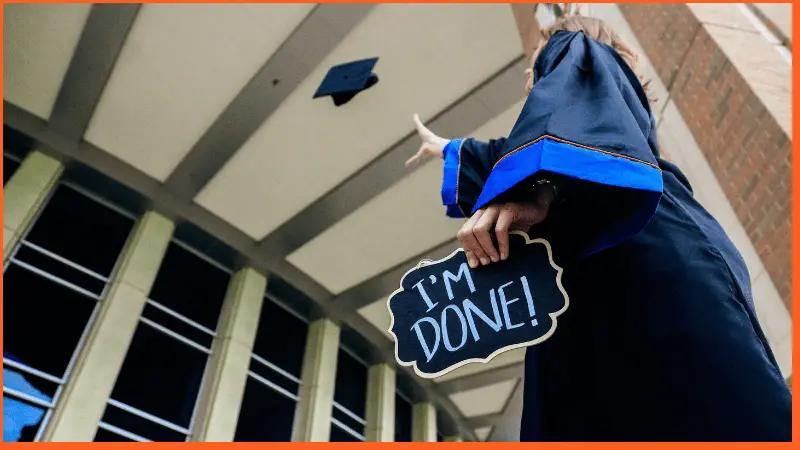There is a common misconception that learning ends once we graduate from school or university… And if we are being honest.
We are usually pretty happy about it.
Until we get hit with real life, and we long to go back to the simple days of just being a student and going to classes.
In this article, we explore whether learning actually ever ends…
Here’s Why Learning Is a Continuous Process:
We may not always realize it directly; however, we are actually learning new things all the time. We absorb lessons, not just at school but also through our work experiences, social interactions, and recreational activities.
Table of Contents

Learning is an ongoing process of gaining a variety of skills and knowledge.
It’s only natural for individuals to learn something on a daily basis, whether consciously or unconsciously. Continuous learning is actually great for the brain and helps keep us mentally healthy.
Those who associate negative thoughts with learning typically think back to days of being forced to study things we weren’t interested in.
To add to this, they were likely required to learn in a way that didn’t really suit them. We commonly learn in different ways, be it visually, audibly, or by doing, to give some examples.
When you can learn about things you enjoy and in a way suited to your learning style, lifelong learning doesn’t become difficult at all!
The reality is also that we need more than formal education to become truly knowledgeable people.
Unfortunately, the formal education system frequently only encourages memorization over the more practical skill of critical thinking. Students will have everything memorized to pass a test, but this information is often forgotten a week later.
To truly master a topic, it is far better to understand what is behind the things you were forced to memorize. This creates a better learning experience as it is something that will stick with you for longer.
Today this is easier to achieve than ever before. In today’s digital world, we have practically instant access to learning about whatever we want.
Online learning with courses and other digital content is a way people look to improve and learn more about their interests and hobbies.
Recommended Reading: Can learning new things be a hobby?
Learning never stops, according to the testimonies compiled by UNESCO. Students, teachers, and parents from the UNESCO Associated Schools Network have shared how they continued to increase their knowledge even after schools shut down because of the COVID-19 pandemic.
Why We Should Never Stop Learning
After high school, many students pursue higher education. Depending on what industry they choose to enter, a college degree is incredibly useful.
After completing this formal education, however, most are ecstatic to be done with “learning”. Finally, they get to throw that graduation cap in the air and never see the inside of a classroom again.
However, most end up realizing that learning doesn’t stop there, and this is a great thing.
In your professional life, jobs will continue to evolve, and you will need to stay up to date to remain competitive.
Some companies do a great job of giving their employees the opportunity to improve their skills further. Other’s will require you to be self-motivated and to want to continue to progress.
Learning involves a myriad of advantages that we can benefit from. Here are several important reasons why we should focus on lifelong learning:
- Learning is essential to our progress in our professional careers and our personal lives. It effectively equips us to perform new tasks and to face new challenges.
- Learning is great for our brain muscles. We need to keep our brains healthy and active through mental workouts.
- Knowledge is a valuable personal investment that others cannot take away from us. A CNBC article quotes the billionaire Warren Buffett:
- “Ultimately, there’s one investment that supersedes all others: Invest in yourself. Nobody can take away what you’ve got in yourself, and everybody has potential they haven’t used yet.”
- Learning transforms us into better people. Both our successes and failures can help us to grow into wiser and stronger individuals.
- Having a rich fountain of knowledge allows us to share helpful information with the people around us. Being a good student of life can transform us into an official or unofficial life teacher as well. Teaching is a great way to continue to learn.
- Learning increases our capacity for compassion. It broadens our limited point of view so we can put ourselves more easily in the shoes of other people.
What Happens if We Stop Learning?
This would be a pretty challenging task since, even subconsciously, you are learning.
It may feel like you are not progressing, but even if you are doing the same thing day by day, you are actually learning to do that task more efficiently and faster. This is not very challenging, however, and it is not a great strategy to follow.
The deliberate or unconscious decision to stop learning is detrimental to our lives in various ways.
We should not stop learning because of the following reasons:
- We will become stunted and stale in the different aspects of our lives if we are not open to learning new things. We will get stuck in performing the same old routines and fulfilling the same old duties over the years.
- If we do not practice learning, we may not maximize the opportunity to enhance our mental skills, including working memory, attention, planning, and organization. The American Psychological Association explains that mental practice and the maturing of the brain are necessary to develop these skills.
- We lose the chance to boost our self-confidence by not investing in personal and professional growth through constructive learning.
- Our failure to learn from past experiences makes us prone to repeating the same mistakes we already made before. It will also hinder us from achieving success using new methods we have never tried before.
- We cannot share what we do not have. If we have limited knowledge, we are not equipped to provide solid advice or to share crucial information with the people around us.
- We will continue to have a narrow point of view if we do not explore new things. As a result, we will have difficulties relating to other people beyond our small social circle.
Learning is a progressive journey.
It never ends because there is always a new skill we can master, new trivia we can memorize, and new information that we can reflect on.
It’s never too late for us to start learning new things, no matter how old we are.
Our natural curiosity and eagerness to learn have allowed humanity to develop the world we see today. Both the simplest and most revolutionary inventions were made because of our continuous learning and progress.
Humans will continue to live longer and healthier lives as we continue to improve our knowledge and systems. It’s incredible that just by learning, a single person can change the world.
We can take a big step to start increasing our knowledge by enrolling in a new course or by shifting to a different profession.
We can also take a small step to start the learning process by simply finishing a new book, watching a tutorial video, or reading more educational blog posts like this one on our website.
Recommended Reading: Is the learning process a skill?
Sources:
https://en.unesco.org/covid19/educationresponse/learningneverstops/testimonies
https://www.cnbc.com/2017/10/04/warren-buffett-says-this-one-investment-supersedes-all-others.html



